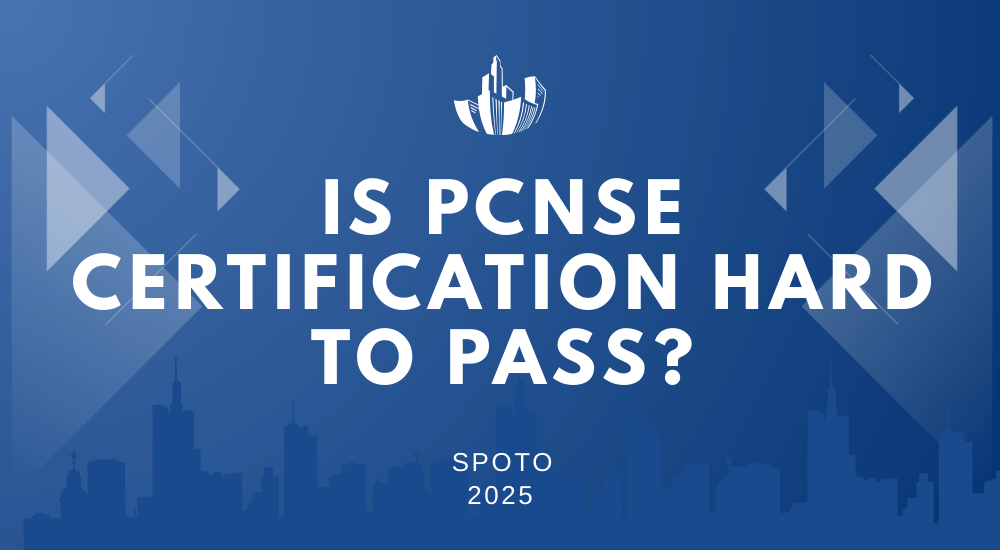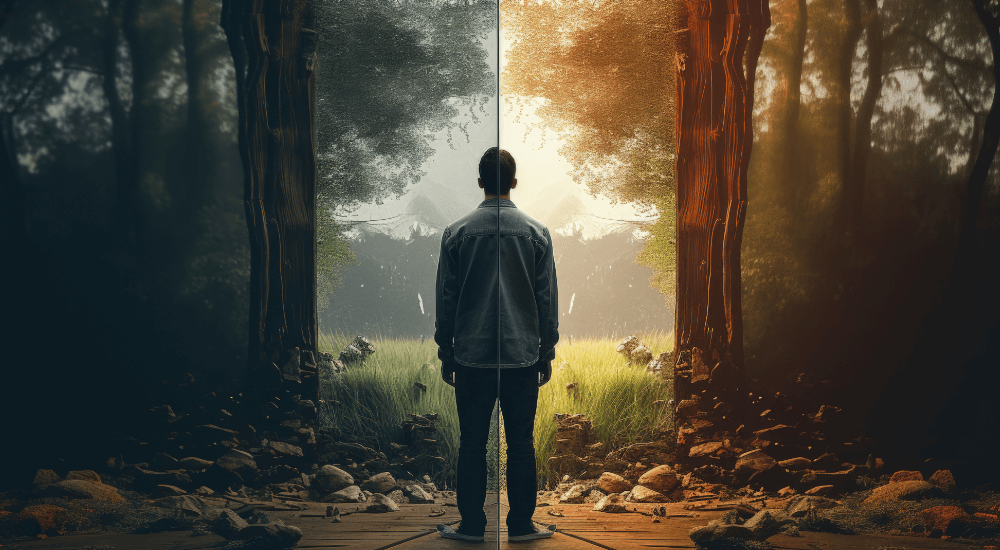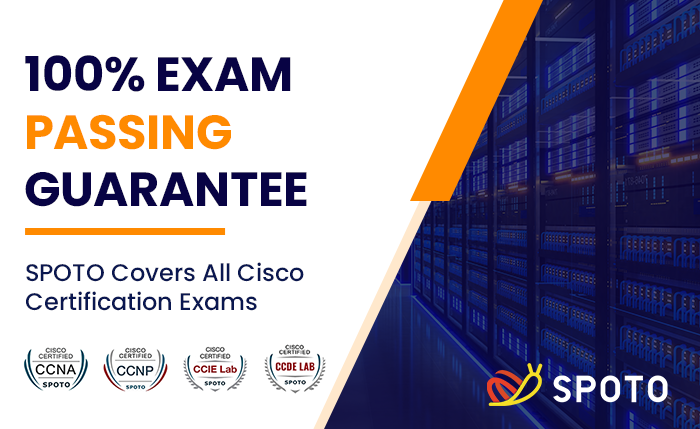TRUSTED BY THE SMARTEST TEAMS IN THE WORLD FOR CERTIFIED CANDIDATES
SPOTO Blogs
Useful learning materials to become certified IT personnel
-
- 634
- circle
- 2025-03-31 11:58
-
- 833
- circle
- 2025-03-31 11:33
-
- 775
- circle
- 2025-03-28 13:24
-
- 643
- circle
- 2025-03-28 11:27
-
- 596
- circle
- 2025-03-27 11:37
-
- 763
- circle
- 2025-03-27 10:44
-
- 553
- circle
- 2025-03-26 11:43
-
- 906
- circle
- 2025-03-26 10:51
-
- 752
- SPOTO
- 2025-03-25 17:33
TRUSTED BY THE SMARTEST TEAMS IN THE WORLD FOR CERTIFIED CANDIDATES
SPOTO Blogs
Useful learning materials to become certified IT personnel
-
- 634
- circle
- 2025-03-31 11:58
The Palo Alto Networks Certified Network Security Engineer (PCNSE) certification is a highly respected credential for professionals working with Palo Alto Networks security technologies. It validates an individual's ability to design, configure, and manage Palo Alto Networks' next-generation firewalls and security solutions. But how difficult is it to pass the PCNSE exam? If you're considering pursuing this certification, you might be wondering about the exam's complexity, the preparation required, and the pass rate. This article breaks down what makes the PCNSE challenging and provides guidance on how to prepare effectively. Understanding the PCNSE Exam Structure Before assessing the difficulty, it's essential to understand what the PCNSE exam entails. The exam tests knowledge across several domains, including: Core firewall technologies and security features Palo Alto Networks' Panorama and cloud security solutions Network security configurations Troubleshooting techniques Best practices for implementation Factors That Make the PCNSE Exam Challenging 1. Broad Range of Topics PCNSE covers a wide range of subjects, including advanced firewall configurations, security policies, network traffic flow, and cloud integration. Candidates must have both theoretical knowledge and hands-on experience. 2. Real-World Application Questions Unlike basic multiple-choice exams that test memorization, PCNSE questions assess your ability to apply knowledge in real-world scenarios. Many questions require you to analyze network security situations and determine the best configuration or troubleshooting steps. 3. Requires Hands-On Experience Many successful candidates stress that practical experience with Palo Alto Networks firewalls is essential. Simply reading study guides may not be enough. If you lack hands-on experience, the exam will feel significantly more difficult. 4. Time Constraints Time is limited; Candidates must answer quickly and efficiently. Some questions are complex and require analyzing multiple factors, making time management crucial. 5. Frequent Updates in Palo Alto Networks Technologies Since cybersecurity and network security tools are always evolving, Palo Alto Networks frequently updates its products. If you're studying outdated materials, you might struggle with new exam content. How to Prepare for the PCNSE Exam Effectively 1. Gain Hands-On Experience If possible, work directly with Palo Alto Networks firewalls. Setting up security policies, managing Panorama, and troubleshooting in a lab environment will significantly boost your confidence and understanding. 2. Use Official Study Resources Palo Alto Networks provides PCNSE study guides, online training, and documentation. Some of the best resources include: Palo Alto Networks PCNSE Study Guide Palo Alto Networks LIVEcommunity forums Official Palo Alto Networks Configuration Guides 3. Enroll in Training Courses Many candidates benefit from structured training courses, such as: Palo Alto Networks' Official Training SPOTO's PCNSE Courses or trainings 4. Take Practice Exams Practice tests help you become familiar with the question format and identify weak areas. Some useful sources for PCNSE practice exams include: Palo Alto Networks' own practice tests Prep books and third-party test banks Quiz-based learning platforms like Whizlabs or Boson 5. Join Study Groups and Online Communities Engaging with others who are also preparing for PCNSE can be beneficial. Study groups allow you to discuss difficult topics and gain insights from experienced professionals. Consider joining: Palo Alto Networks' LIVEcommunity Reddit's networking forums LinkedIn PCNSE Study Groups 6. Develop a Study Plan Create a structured study plan that includes: Daily study sessions (1-2 hours per day) Weekly hands-on labs for practical experience Regular practice tests to gauge readiness Conclusion So, is PCNSE certification hard to pass? Yes, it can be challenging, especially if you lack hands-on experience or underestimate the depth of knowledge required. However, with proper preparation, study materials, and practice, passing the PCNSE exam is entirely achievable. If you're serious about becoming a Palo Alto Networks Certified Network Security Engineer, start preparing with structured training, hands-on labs, and practice exams. By dedicating time and effort, you can overcome the challenge and gain a highly valuable cybersecurity certification. -
- 833
- circle
- 2025-03-31 11:33
The Project Management Professional (PMP) certification, offered by the Project Management Institute (PMI), is one of the most sought-after credentials for project managers worldwide. Whether you're looking to advance your career, increase your earning potential, or improve your project management skills, the PMP certification is a valuable asset. But before you dive into the certification process, there are several key things you need to know. This guide will walk you through everything from eligibility requirements to exam preparation and the benefits of becoming PMP-certified. What is PMP Certification? The PMP certification is a globally recognized credential that validates your knowledge, experience, and expertise in project management. It is designed for professionals who lead and direct projects, ensuring they meet scope, time, cost, and quality requirements. PMP is based on the PMBOK (Project Management Body of Knowledge) and tests candidates on the three main domains of project management: People – Managing and leading teams effectively. Process – Handling technical aspects of project management. Business Environment – Aligning projects with organizational goals. Who Should Get PMP Certified? The PMP certification is ideal for professionals working in project management roles across various industries, including IT, construction, healthcare, finance, and manufacturing. It is best suited for: Project Managers Team Leads Program Managers Project Coordinators Consultants Anyone aspiring to move into a project management role What is the PMP Exam Like? The PMP exam is designed to test your ability to apply project management principles in real-world scenarios. Here's what you can expect: Exam Length: 180 questions Duration: 270 minutes Domains Covered: People Process Business Environment Validity Period: 3 years Cost: PMI Members: US$405 How to Prepare for the PMP Exam 1. Study the PMBOK Guide and Exam Content Outline The PMBOK Guide is the foundation of PMP exam content. However, the exam also covers agile and hybrid project management methodologies, so review PMI's latest Exam Content Outline to ensure you're studying the right material. 2. Enroll in a PMP Training Course Since 35 hours of project management education is required, many candidates take an official PMP prep course. Some popular options include: PMI Authorized PMP Exam Prep Simplilearn PMP Certification Training Udemy and Coursera PMP Courses Project Management Academy 3. Take Practice Exams Practice exams help you get comfortable with the PMP question format and time constraints. Some reliable sources for mock exams include: PMI's Official PMP Practice Tests PM PrepCast Simulator SPOTO PMP Practice Exams 4. Join PMP Study Groups & Online Communities Engaging in PMP study groups or forums can keep you motivated and provide valuable insights. Some great communities include: PMI's Official Discussion Groups Reddit's r/pmp Community LinkedIn PMP Groups Discord PMP Study Groups 5. Develop a Study Plan A structured study plan can help you cover all necessary topics efficiently. A good plan should include: Daily study sessions (1-2 hours per day) Weekly practice tests Review sessions for weak areas Mock exams two weeks before the actual test What Happens After You Pass the PMP Exam? 1. Earn Your PMP Certification Once you pass the exam, you will receive your PMP credential and be officially recognized as a certified project management professional. 2. Boost Your Career Prospects Many organizations prefer or require PMP-certified project managers. The certification can open doors to leadership roles and higher-paying jobs. 3. Maintain Your PMP Certification To keep your PMP credential active, you must earn 60 Professional Development Units (PDUs) every three years. PDUs can be earned through: Work experience in project management Attending PMI events and webinars Taking additional courses and training Is PMP Certification Worth It? The PMP certification is one of the best investments for professionals looking to advance in project management. It provides higher salary potential, better job opportunities, and global recognition. However, it requires dedication, study, and hands-on experience to succeed. If you meet the eligibility criteria and are ready to commit to the process, PMP certification can be a game-changer for your career. Start by planning your study strategy today, and take the first step toward becoming a certified project management professional! -
- 775
- circle
- 2025-03-28 13:24
In today's rapidly evolving cybersecurity landscape, network security professionals must stay ahead of threats and master the latest security technologies. One way to demonstrate expertise is by earning industry-recognized certifications, and the Palo Alto Networks Certified Network Security Engineer (PCNSE) certification is one of the best options available. If you're considering the PCNSE but aren't sure what it entails or whether it's the right choice for your career, this guide will cover everything you need to know, from exam details to the benefits of certification. What is the PCNSE Certification? The Palo Alto Networks Certified Network Security Engineer (PCNSE) is a vendor-specific certification that validates your expertise in Palo Alto Networks security technologies. It is designed for IT professionals who configure, manage, and troubleshoot Palo Alto firewalls and security solutions in enterprise environments. This certification is highly respected in the industry, particularly for roles focused on network security, cybersecurity architecture, and firewall management. Why is the PCNSE Certification Important? 1. Industry Recognition The PCNSE is recognized worldwide as a leading cybersecurity certification. As companies prioritize security, professionals with Palo Alto expertise are in high demand. 2. Career Advancement Opportunities Holding a PCNSE can qualify you for roles such as: Network Security Engineer Cybersecurity Architect Firewall Administrator SOC Analyst Security Consultant Certified professionals often see higher salaries and faster career growth compared to non-certified peers. 3. Hands-On Knowledge Unlike some theory-heavy certifications, the PCNSE focuses on real-world skills, including configuring Palo Alto firewalls, implementing security policies, and troubleshooting security issues. This makes it practical and directly applicable to day-to-day job roles. 4. Employer Preference Many organizations use Palo Alto Networks firewalls as their primary security solution. They actively seek professionals with PCNSE certification to ensure their security infrastructure is properly managed. PCNSE Exam Overview The PCNSE exam tests your knowledge of Palo Alto Networks products and security technologies. Here's what you need to know: Exam Name: Palo Alto Networks Certified Network Security Engineer (PCNSE) Exam Duration: 90 minutes Number of Questions: 75 Format: Multiple-choice, Scenarios with Graphics Exam Fee: $175 USD Validity Period: 2 years PCNSE Exam Topics The PCNSE exam covers a wide range of topics related to Palo Alto Networks security solutions. The key domains include: Planning and Core Concepts 19% Deploy and Configure 32% Deploy and Configure Firewalls Using Panorama 13% Manage and Operate 16% Troubleshooting 20% Who Should Take the PCNSE? The PCNSE is best suited for IT professionals working in network security and firewall management roles. You should consider this certification if you: Have experience with Palo Alto firewalls (physical or virtual) Work in network security operations or cybersecurity architecture Want to specialize in Palo Alto Networks security solutions Are pursuing a career in SOC (Security Operations Center) roles How to Prepare for the PCNSE Exam 1. Study the Official Palo Alto Networks Documentation Palo Alto provides detailed admin guides, best practices, and configuration examples on their website. These resources align closely with the exam content. 2. Take the Palo Alto Networks Training Courses Palo Alto offers official training. While not required, these courses provide in-depth knowledge that is directly applicable to the PCNSE exam. 3. Set Up a Practice Lab Hands-on experience is crucial. You can: Use Palo Alto's VM-Series firewalls in a virtual lab environment Practice configuring security policies, NAT, VPNs, and troubleshooting logs Experiment with Panorama for centralized firewall management 4. Take PCNSE Practice Exams Practice tests help you get familiar with the exam format and identify weak areas. Use resources such as: Palo Alto's official practice tests Third-party mock exams from SPOTO Online communities like Reddit and Palo Alto certification forums 5. Join Study Groups & Forums Engage with other PCNSE candidates and certified professionals in online forums like: Palo Alto Networks Live Community LinkedIn groups CCIE and PCNSE study groups on Discord and Telegram Is the PCNSE Worth It? If you work in network security and want to specialize in Palo Alto Networks technologies, the PCNSE is absolutely worth it. Here's why: Job Market Demand: Many companies prefer hiring PCNSE-certified professionals for firewall and security management roles. Competitive Salary: Certified engineers often earn higher salaries than non-certified counterparts. Career Growth: PCNSE certification opens doors to advanced roles in cybersecurity and network security. Real-World Skills: Unlike purely theoretical certifications, the PCNSE ensures you develop hands-on technical expertise. Conclusion The PCNSE certification is an excellent choice for network security professionals looking to validate their expertise in Palo Alto Networks security solutions. It is well-respected in the industry and can help you land high-paying cybersecurity roles. By following a structured study plan, gaining hands-on experience, and using the right study materials, you can pass the PCNSE exam and take your network security career to the next level. If you're serious about excelling in firewall management and network security, the PCNSE is a certification you won't regret pursuing! -
- 643
- circle
- 2025-03-28 11:27
Table of ContentsCommon Mistakes That Lead to FailureEffective Study Strategies for CCNP SuccessConclusion The Cisco Certified Network Professional (CCNP) certification is a major stepping stone for networking professionals aiming to advance their careers. However, many candidates fail the CCNP exams, not because they lack intelligence or dedication, but because they approach their studies the wrong way. If you're preparing for CCNP, you need to avoid common pitfalls and adopt study techniques that actually work. This article will highlight the most frequent mistakes CCNP candidates make and provide strategies to ensure you pass on your first attempt. Common Mistakes That Lead to Failure 1. Relying Solely on Theoretical Knowledge One of the biggest mistakes candidates make is focusing too much on theory and neglecting practical application. The CCNP exams, especially ENCOR (Enterprise Core), require deep hands-on experience. Solution: Set up a home lab using real Cisco devices or virtual tools like Cisco Packet Tracer, GNS3, or EVE-NG. Practice configuring OSPF, EIGRP, BGP, VLANs, and security features in a real-world environment. Troubleshoot network scenarios instead of just reading about them. 2. Using Outdated Study Materials Cisco updates its exams regularly, and many candidates unknowingly use outdated study resources that no longer align with the current CCNP exam blueprint. Solution: Always refer to Cisco's official exam topics to ensure you're studying relevant content. Use updated Cisco Press books, official training courses, and vendor-approved online platforms. Join forums like Cisco Learning Network and Reddit's networking community to stay informed about changes. 3. Memorizing Concepts Instead of Understanding Them Many candidates try to memorize exam questions, commands, or configurations without truly understanding how and why they work. The problem? The CCNP exams are designed to test deep comprehension, not rote memorization. Solution: Instead of memorizing commands, learn what each command does and how it applies to different networking scenarios. Use real-world examples to reinforce your understanding. Explain concepts out loud or teach them to someone else to solidify your knowledge. 4. Ignoring Practice Exams Many candidates assume that reading books and watching video courses is enough. However, without taking practice exams, they fail to gauge their readiness and struggle under real exam conditions. Solution: Take mock exams under timed conditions to simulate the real test. Analyze your mistakes and review weak areas until you consistently score above 85-90%. Use practice tests from SPOTO or official Cisco exam prep tools. 5. Skipping the Official Cisco Labs Cisco provides official practice labs, but many candidates ignore them, thinking they are unnecessary. The lab sections of CCNP exams require hands-on problem-solving skills, and skipping practical practice is a surefire way to fail. Solution: Work through Cisco's official CCNP labs and online simulations. Practice troubleshooting different configurations rather than just setting them up. Challenge yourself with real-world networking issues to improve your analytical skills. 6. Not Managing Time Effectively Time management is crucial during the CCNP exam. Candidates often get stuck on difficult questions and run out of time before answering all the questions. Solution: During practice exams, train yourself to move on quickly from difficult questions and return to them later if time permits. Use the elimination method to rule out incorrect answers efficiently. Allocate a set time per question and stick to it. 7. Studying Without a Clear Plan Many candidates start studying randomly without a structured plan, leading to inefficiency and wasted time. Solution: Create a study schedule covering all exam topics and stick to it. Use the 80/20 rule: Focus 80% of your time on high-weighted exam topics and 20% on lesser-weighted ones. Set milestones (e.g., finish routing topics in two weeks, complete security modules in one week, etc.) to track progress. Effective Study Strategies for CCNP Success Now that you know what NOT to do, here are some best practices to ensure you pass your CCNP exam on the first attempt. 1. Follow a Structured Study Plan Break your study schedule into manageable chunks: Weeks 1-3: Focus on fundamentals (Routing, Switching, VLANs, VPNs). Weeks 4-6: Deep dive into advanced topics like BGP, OSPF, MPLS, and SD-WAN. Weeks 7-8: Practice labs and simulations daily. Final Week: Take full-length practice exams and review weak areas. 2. Mix Theory with Hands-On Labs Read one chapter or watch a video, then immediately apply what you learned in a lab environment. Focus on real-world troubleshooting scenarios, as CCNP heavily tests problem-solving abilities. 3. Join Online Study Groups Engage in CCNP discussion forums, WhatsApp groups, or Discord communities. Participate in study challenges and ask for explanations when you don't understand a concept. 4. Take Advantage of Cisco's Official Training and Resources Enroll in Cisco Learning Network for updated training materials. Use Cisco Packet Tracer for quick labs and simulations. Follow Cisco's official blueprint to avoid studying unnecessary topics. 5. Maintain Consistency and Avoid Burnout Study in short, focused sessions rather than cramming. Take regular breaks to maintain mental clarity. Get adequate rest before the exam to ensure peak performance. Conclusion Failing the CCNP exam is often the result of studying inefficiently, not a lack of ability. By avoiding common mistakes like relying only on theory, using outdated materials, and skipping hands-on labs, you can significantly increase your chances of passing. Approach your CCNP preparation with a structured plan, hands-on practice, and regular self-assessment. With the right mindset and strategy, you won't just pass—you'll excel and take your networking career to the next level! -
- 596
- circle
- 2025-03-27 11:37
Fortinet certifications are highly regarded in the cybersecurity industry, helping professionals validate their expertise in Fortinet security solutions. Among the advanced certification levels, two stand out: Fortinet Certified Expert (FCX) and Fortinet Certified Solution Specialist (FCSS). While both certifications demonstrate a high level of proficiency, they serve different purposes and are designed for distinct career paths. If you're trying to decide which certification to pursue, this guide will break down the key differences, requirements, and career benefits of FCX and FCSS to help you make the right choice. Understanding FCX: The Highest Level of Fortinet Certification What is FCX? FCX (Fortinet Certified Expert) is Fortinet's most prestigious certification, validating mastery of Fortinet's security technologies and advanced cybersecurity concepts. It is intended for professionals who architect, design, and troubleshoot complex Fortinet solutions at an enterprise level. Who Should Pursue FCX? FCX is best suited for experienced security professionals who: Work as security architects, consultants, or technical leads. Manage enterprise-level or service provider security infrastructure. Require deep expertise in Fortinet's security solutions. Have extensive experience with FortiGate, FortiManager, FortiAnalyzer, and other Fortinet products. FCX Exam and Requirements Candidates must pass a rigorous lab exam that tests real-world problem-solving skills. There is no formal prerequisite, but prior Fortinet certifications (like FCSS or FCP) and extensive hands-on experience are highly recommended. The exam covers advanced security architecture, troubleshooting, and optimization. Benefits of FCX Certification Recognized as a top-tier cybersecurity certification. Opens doors to high-level job roles such as Security Architect, Senior Network Security Engineer, and Cybersecurity Consultant. Provides in-depth expertise in complex security solutions and enterprise-wide Fortinet deployments. Understanding FCSS: The Fortinet Solution Specialist Certification What is FCSS? FCSS (Fortinet Certified Solution Specialist) is a specialized certification designed for professionals who deploy and manage Fortinet solutions in specific domains, such as network security, cloud security, or secure SD-WAN. Who Should Pursue FCSS? FCSS is ideal for professionals who: Work as network security engineers, administrators, or consultants. Specialize in specific Fortinet technologies such as FortiGate, FortiWeb, FortiNAC, or FortiMail. Want to gain deep technical expertise in a focused area of Fortinet solutions. FCSS Exam and Requirements Candidates must pass a specialized exam focused on a particular Fortinet solution area. Prerequisites usually include the Fortinet Certified Professional (FCP) certification in the corresponding domain. The exam tests practical knowledge in configuration, troubleshooting, and best practices for Fortinet solutions. Benefits of FCSS Certification Validates expertise in specific Fortinet products and solutions. Helps professionals advance into specialized roles such as Network Security Engineer, Security Operations Specialist, or SD-WAN Expert. Demonstrates deep technical skills within a narrow but highly relevant domain. Key Differences Between FCX and FCSS Certification Level: FCX is the highest Fortinet certification, while FCSS is a specialist-level certification. Scope of Knowledge: FCX covers enterprise-wide security architecture, while FCSS focuses on specific Fortinet solutions. Job Roles: FCX is designed for architects and senior security professionals, whereas FCSS is suited for solution specialists and technical implementers. Exam Difficulty: FCX requires passing a challenging lab-based exam, while FCSS involves focused exams on particular Fortinet technologies. Prerequisites: FCX has no official prerequisites but requires extensive hands-on experience, while FCSS typically requires an FCP certification in the corresponding domain. Which Certification Should You Choose? Choose FCX if: You want to be recognized as an expert in enterprise-level Fortinet security. You are responsible for designing, troubleshooting, and managing large-scale security deployments. You aim for high-level cybersecurity roles such as Security Architect or Principal Security Engineer. Choose FCSS if: You specialize in specific Fortinet products, such as FortiGate, FortiSIEM, or FortiMail. You work in network security operations and want to deepen your expertise in a particular area. You are looking for a certification that enhances your technical skills in a focused Fortinet solution. Conclusion Both FCX and FCSS are valuable Fortinet certifications, but they cater to different career paths. FCX is the ultimate certification for cybersecurity professionals seeking to demonstrate expert-level mastery of Fortinet solutions, while FCSS is ideal for specialists looking to deepen their expertise in specific Fortinet technologies. Choosing the right certification depends on your career goals, technical experience, and desired level of expertise. If you aspire to lead security architecture and design large-scale Fortinet deployments, FCX is the way to go. If you prefer to specialize in a specific domain and gain deep technical skills, FCSS is a perfect fit. Whichever path you choose, both certifications will significantly boost your career in cybersecurity and Fortinet solutions! -
- 763
- circle
- 2025-03-27 10:44
The Cisco Certified Internetwork Expert (CCIE) certification is one of the most challenging and respected networking certifications in the IT industry. Achieving CCIE status is a testament to your expert-level networking knowledge and hands-on skills. However, passing the CCIE exam requires extensive preparation, discipline, and the right study approach. If you're planning to take the CCIE exam, you might be wondering, What's the best way to study? In this guide, we'll walk you through the most effective strategies to prepare for the CCIE written and lab exams, helping you maximize your chances of success. Understand the CCIE Exam Structure Before diving into preparation strategies, it's crucial to understand the CCIE exam format. The CCIE certification consists of two parts: The Written Exam: This is a qualifying exam that tests your theoretical knowledge of networking concepts. You must pass this exam before attempting the lab exam. The Lab Exam: This is an intense 8-hour hands-on practical exam that assesses your ability to configure and troubleshoot complex network scenarios. Each CCIE track, such as Enterprise Infrastructure, Security, Data Center, Collaboration, and Service Provider, has its own specific exam topics and requirements. Make sure you review the blueprint for your chosen track. Step 1: Build a Solid Theoretical Foundation Since the CCIE written exam is the first hurdle, you need a deep understanding of networking concepts. Here's how to build your theoretical foundation: Use Official Cisco Materials: Cisco Press books and official certification guides are excellent resources. Enroll in a Training Program: Platforms like Cisco's official training courses, SPOTO, and other reputable providers offer structured learning paths. Join Study Groups: Engaging with peers in forums like Cisco Learning Network and Reddit's networking community can provide insights and different perspectives. Take Notes and Summarize: Writing down key concepts helps reinforce learning and makes it easier to review later. Step 2: Get Hands-On Practice The CCIE is not just about theoretical knowledge; hands-on experience is critical. Here's how to get practical experience: Set Up a Home Lab: If possible, build a physical lab using Cisco devices to practice configurations and troubleshooting. Use Cisco's VIRL or GNS3: Virtual lab environments like Cisco VIRL, GNS3, or EVE-NG allow you to simulate real-world network scenarios. Work on Real-World Scenarios: Challenge yourself with real network design and troubleshooting tasks rather than just following lab guides. Time Yourself: Since the CCIE lab exam is time-bound, practice under exam-like conditions to improve speed and efficiency. Step 3: Take Practice Exams Mock exams are an essential part of CCIE preparation. They help you assess your knowledge and identify weak areas. Here's how to incorporate practice exams into your study plan: Use Cisco's Official Practice Tests: These simulate the actual exam and provide a benchmark of your readiness. Leverage Third-Party Providers: Training providers like SPOTO offer high-quality CCIE practice exams that mimic real exam conditions. Review Incorrect Answers: Understanding why you got a question wrong is more valuable than simply memorizing the right answer. Repeat Until You Achieve Consistency: Aim for consistent high scores before attempting the real exam. Step 4: Develop an Effective Study Plan Given the complexity of the CCIE exam, having a structured study plan is essential. Here's how to create an effective one: Set a Study Schedule: Dedicate specific hours each day or week to studying. Break It Down: Divide topics into manageable sections and tackle them one at a time. Mix Theory with Practice: Alternate between reading and hands-on lab exercises to reinforce learning. Allocate Time for Revision: Regularly revisit previous topics to ensure retention. Avoid Cramming: CCIE requires deep understanding, which takes time to develop. Step 5: Join a Bootcamp Many candidates find CCIE bootcamps beneficial, especially before taking the lab exam. These intensive training programs offer: Instructor-Led Training: Learn from experienced CCIE-certified instructors. Realistic Lab Scenarios: Work on labs that closely resemble the actual CCIE exam. Personalized Feedback: Get insights into your strengths and areas that need improvement. Popular bootcamp providers include Cisco's official training, INE, and SPOTO. Step 6: Stay Consistent and Motivated Studying for CCIE can be overwhelming, but consistency is key. Here are some tips to stay motivated: Set Clear Goals: Define why you want to achieve CCIE certification and remind yourself of your end goal. Join a Study Group: Studying with others can keep you accountable and motivated. Take Breaks: Burnout is real—schedule short breaks to maintain productivity. Celebrate Small Wins: Acknowledge progress to stay encouraged. Step 7: Prepare for Exam Day When your exam day approaches, follow these last-minute preparation tips: Review Your Notes and Summaries: Focus on key concepts and common trouble areas. Get a Good Night's Sleep: Being well-rested improves focus and performance. Arrive Early: Ensure you have ample time to check in and settle before the exam. Stay Calm and Confident: Trust your preparation and approach the exam with a positive mindset. Conclusion Earning your CCIE certification is a challenging but rewarding journey that requires a mix of theoretical study, hands-on practice, and structured preparation. By following these steps—building a strong foundation, practicing consistently, taking mock exams, and maintaining motivation—you can significantly increase your chances of success. Whether you choose self-study, bootcamps, or a combination of both, the key is to stay disciplined and focused on your goal. With the right approach, you'll be on your way to becoming a CCIE-certified networking expert! -
- 553
- circle
- 2025-03-26 11:43
The Cisco Certified Internetwork Expert (CCIE) certification is the pinnacle of networking certifications, demonstrating elite-level expertise in complex networking solutions. Two of the most sought-after CCIE tracks are CCIE Enterprise Infrastructure (EI) and CCIE Service Provider (SP). While both certifications validate expert networking skills, they cater to different career paths and technical specializations. If you're an experienced networking professional looking to advance your career, choosing between CCIE EI and CCIE SP is crucial. This guide will help you understand the key differences, benefits, and career implications of each certification to make an informed decision. Understanding CCIE Enterprise Infrastructure (EI) What is CCIE EI? CCIE Enterprise Infrastructure (EI) focuses on designing, deploying, and troubleshooting enterprise-level network solutions. This certification is ideal for professionals working with large organizations that require robust, scalable, and secure networking solutions. Core Focus Areas CCIE EI covers advanced routing and switching, network automation and programmability, security and wireless networking, SD-WAN and software-defined networking (SDN), and high availability and network optimization. These areas ensure that certified professionals can manage enterprise networks efficiently. Who Should Pursue CCIE EI? CCIE EI is best suited for network engineers managing corporate IT infrastructures, IT professionals responsible for enterprise networking and security, professionals looking to specialize in SD-WAN and automation, and individuals working in data centers and cloud networking environments. Career Benefits of CCIE EI Achieving CCIE EI certification qualifies you for high-paying roles such as Enterprise Network Architect, Senior Network Engineer, and IT Director. The demand for CCIE EI professionals is high across various industries, including healthcare, finance, and education. Additionally, CCIE EI provides strong expertise in automation and programmability, aligning with modern networking trends. Understanding CCIE Service Provider (SP) What is CCIE SP? CCIE Service Provider (SP) is designed for professionals managing large-scale service provider networks. This certification focuses on advanced networking solutions for ISPs, telecommunications companies, and cloud service providers. Core Focus Areas CCIE SP covers advanced MPLS and segment routing, service provider architecture and infrastructure, core IP routing and Layer 3 VPNs, carrier-grade NAT and IPv6 deployment, and network automation for service provider environments. These topics ensure that certified professionals can design and operate high-performance service provider networks. Who Should Pursue CCIE SP? CCIE SP is ideal for engineers working in ISPs, telecom companies, or cloud service providers. It is also suited for professionals responsible for large-scale networking solutions, experts looking to specialize in MPLS, BGP, and service provider automation, and individuals managing high-availability networks with complex routing protocols. Career Benefits of CCIE SP This certification opens up roles such as Service Provider Network Engineer, Network Consultant, and ISP Architect. There is a high demand for CCIE SP professionals in the telecom and cloud service provider industries. Specializing in large-scale networking solutions gives professionals a competitive edge in the job market. Key Differences Between CCIE EI and CCIE SP CCIE Enterprise Infrastructure focuses on enterprise network solutions, while CCIE Service Provider is tailored for large-scale service provider networks. CCIE EI professionals primarily work with technologies like routing, switching, SD-WAN, and automation, whereas CCIE SP professionals specialize in MPLS, BGP, segment routing, and L3VPNs. Those who work in corporate IT environments and want to focus on SD-WAN, security, and automation should choose CCIE EI. On the other hand, professionals working in telecom, ISPs, or cloud provider environments should pursue CCIE SP, as it focuses on large-scale routing and service provider technologies. How to Choose the Right Certification Choose CCIE EI if: You work in an enterprise IT environment. You want to focus on SD-WAN, security, and automation. You aim for roles in corporate networking and infrastructure. You prefer working on in-house IT networks rather than ISP-grade networks. Choose CCIE SP if: You work in a telecom, ISP, or cloud provider environment. You want to specialize in advanced MPLS, BGP, and service provider networking. You are passionate about large-scale network infrastructure and carrier-grade solutions. You aim for roles that focus on global networking solutions. Conclusion Both CCIE Enterprise Infrastructure and CCIE Service Provider are prestigious certifications that offer immense career growth and salary potential. The best choice depends on your career goals, industry preference, and technical interests. If you want to work with enterprise-level networks, automation, and SD-WAN, CCIE EI is the way to go. If you prefer large-scale service provider environments, MPLS, and high-capacity networking, CCIE SP is your ideal choice. Whichever path you choose, earning a CCIE certification is a game-changer that will elevate your expertise and unlock new professional opportunities. -
- 906
- circle
- 2025-03-26 10:51
The IT industry is evolving rapidly, and with it, the demand for highly skilled networking professionals is on the rise. If you're looking to boost your salary and unlock better job opportunities, obtaining a Cisco Certified Network Professional (CCNP) certification might be the key to achieving your career goals. Whether you're an aspiring network engineer or an experienced IT professional looking to advance, CCNP certification can open doors to new opportunities, higher earnings, and greater job security. Why CCNP Matters 1. Industry Recognition and Credibility Cisco is a global leader in networking technology, and its certifications are highly respected across the IT industry. Earning a CCNP certification demonstrates your expertise in networking concepts, troubleshooting, and advanced networking solutions. Employers recognize CCNP-certified professionals as skilled, knowledgeable, and capable of handling complex networking environments. 2. Increased Salary Potential One of the most compelling reasons to pursue a CCNP certification is the potential salary increase. According to various industry reports, networking professionals with CCNP certification earn significantly more than their non-certified counterparts. On average, a CCNP-certified network engineer can earn anywhere between $90,000 and $130,000 per year, depending on experience, location, and specialization. 3. Better Job Opportunities With a CCNP certification, you can qualify for higher-level positions such as: Network Engineer Network Administrator Systems Engineer IT Manager Security Analyst Many companies prioritize CCNP-certified professionals for these roles, as they require advanced networking knowledge and hands-on skills. CCNP Certification Tracks Cisco offers multiple CCNP certification tracks to cater to different IT specializations. Some of the most popular ones include: CCNP Enterprise: Focuses on networking technologies such as routing, switching, wireless, and automation. CCNP Security: Concentrates on network security, firewall policies, and VPN solutions. CCNP Data Center: Covers data center networking technologies, including automation and storage networking. CCNP Collaboration: Specializes in voice, video, and communication technologies. CCNP Service Provider: Targets networking professionals working in service provider environments. Choosing the right CCNP track depends on your career goals and areas of interest. How to Get CCNP Certified 1. Prerequisites Unlike previous Cisco certification structures, CCNP no longer requires you to first obtain a CCNA certification. However, having a solid networking foundation and relevant experience is beneficial. 2. Exam Structure To earn a CCNP certification, you must pass two exams: A core exam: This covers fundamental topics within your chosen track. A concentration exam: This allows you to specialize in a specific area of networking within that track. For example, if you're pursuing CCNP Enterprise, you would take: Core Exam: ENCOR 350-401 Concentration Exam: Options include ENARSI 300-410 (Advanced Routing and Services), ENSDWI 300-415 (SD-WAN), etc. 3. Training and Study Resources To prepare for the CCNP exams, you can use a combination of study materials, including: Official Cisco training courses Practice exams from providers like SPOTO Cisco Press books and study guides Online networking forums and study groups Hands-on lab experience using Cisco Packet Tracer or real networking equipment Benefits Beyond Salary While salary and job prospects are significant motivators, CCNP certification also offers additional benefits: Enhanced Skills: You'll gain in-depth knowledge and hands-on experience, making you a more capable networking professional. Career Flexibility: A CCNP certification opens doors to various industries, from healthcare to finance, as every organization relies on networking. Job Security: With businesses increasingly dependent on secure and efficient networks, skilled networking professionals are always in demand. Pathway to Advanced Certifications: CCNP serves as a stepping stone to expert-level certifications like CCIE (Cisco Certified Internetwork Expert), further solidifying your career growth. Conclusion If you want a higher salary, better job prospects, and a more secure future in IT networking, pursuing a CCNP certification is a smart investment. With Cisco's industry-recognized credentials, you can position yourself as a top-tier networking professional, gain access to lucrative job opportunities, and future-proof your career. Start your CCNP journey today and take control of your professional growth! -
- 752
- SPOTO
- 2025-03-25 17:33
Table of Contents1. IT Support and Help Desk Certifications2. Networking Certifications3. Cloud Computing Certifications4. Data and AI Certifications5. DevOps and Automation Certifications6. Software Development Certifications7. Project Management Certifications8. System Administration Certifications9. Database Management Certifications10. Cybersecurity CertificationsConclusion The tech industry is evolving rapidly, and staying ahead requires continuous learning and upskilling. Whether you're just starting out or looking to advance your career, earning the right certifications can open doors to high-paying roles and exciting opportunities. In this blog, we'll show the top 10 tech certifications for 2025 across various domains, including IT support, networking, cloud computing, data and AI, DevOps, software development, project management, system administration, database management, and cybersecurity. 1. IT Support and Help Desk Certifications CompTIA A+ Why It's Important: A foundational certification covering hardware, software, troubleshooting, and basic networking. Ideal For: Beginners looking to start a career in IT. CompTIA Network+ Why It's Important: Focuses on networking concepts, protocols, and infrastructure. Ideal For: Those aiming for roles in IT support or networking. CompTIA Security+ Why It's Important: Introduces essential cybersecurity concepts like threat management and network security. Ideal For: IT professionals transitioning into cybersecurity. 2. Networking Certifications Cisco Certified Network Associate (CCNA) Why It's Important: Covers networking fundamentals, IP services, security, and automation. Ideal For: Aspiring network administrators. Cisco Certified Network Professional (CCNP) Why It's Important: Advanced certification focusing on network design, security, and troubleshooting. Ideal For: Experienced networking professionals. 3. Cloud Computing Certifications AWS Certified Cloud Practitioner Why It's Important: Entry-level certification covering AWS cloud fundamentals. Ideal For: Beginners in cloud computing. AWS Certified Solutions Architect – Associate Why It's Important: Teaches how to design scalable, secure, and cost-efficient cloud solutions. Ideal For: Aspiring cloud architects. Microsoft Certified: Azure Solutions Architect Expert Why It's Important: Focuses on designing and implementing solutions on Microsoft Azure. Ideal For: Professionals in the Microsoft ecosystem. 4. Data and AI Certifications Google Professional Data Engineer Why It's Important: Covers designing and managing data processing systems on Google Cloud. Ideal For: Data engineers and analysts. Microsoft Certified: Azure AI Engineer Associate Why It's Important: Focuses on building and deploying AI solutions using Azure. Ideal For: AI engineers and developers. 5. DevOps and Automation Certifications AWS Certified DevOps Engineer – Professional Why It's Important: Focuses on automating and managing systems at scale. Ideal For: DevOps professionals. Microsoft Certified: DevOps Engineer Expert Why It's Important: Covers Azure DevOps tools and practices. Ideal For: DevOps engineers in the Microsoft ecosystem. 6. Software Development Certifications AWS Certified Developer – Associate Why It's Important: Teaches how to build and deploy applications on AWS. Ideal For: Cloud-native developers. Oracle Certified Professional: Java SE Programmer Why It's Important: Validates expertise in Java programming. Ideal For: Enterprise software developers. 7. Project Management Certifications CompTIA Project+ Why It's Important: Covers essential project management concepts. Ideal For: IT professionals managing small projects. PMP (Project Management Professional) Why It's Important: Globally recognized certification for managing complex projects. Ideal For: Experienced project managers. 8. System Administration Certifications Microsoft Certified: Azure Administrator Associate Why It's Important: Focuses on managing Azure cloud resources. Ideal For: Cloud administrators. Red Hat Certified System Administrator (RHCSA) Why It's Important: Validates skills in managing Red Hat Enterprise Linux systems. Ideal For: Linux system administrators. 9. Database Management Certifications Microsoft Certified: Azure Database Administrator Associate Why It's Important: Covers managing databases in Azure. Ideal For: Database administrators in cloud environments. 10. Cybersecurity Certifications CompTIA Security+ Why It's Important: Entry-level certification covering essential cybersecurity concepts. Ideal For: Beginners in cybersecurity. eLearnSecurity Junior Penetration Tester (eJPT) Why It's Important: Focuses on penetration testing and ethical hacking. Ideal For: Aspiring penetration testers. Conclusion Earning the right certifications can significantly boost your career prospects and earning potential in the tech industry. Whether you're interested in IT support, cloud computing, data and AI, or cybersecurity, there's a certification that can help you achieve your goals. If you're unsure where to start or which certification best aligns with your career aspirations, consider reaching out to the SPOTO team for personalized guidance and analysis. Start your journey today and stay ahead in the ever-evolving tech landscape.










)


